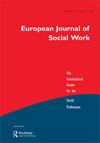The construction of the unmotivated client as a tool for solving the dilemma between control and reflexive approaches of social workers working with vulnerable children in the Czech Republic
IF 1.6
3区 社会学
Q2 SOCIAL WORK
引用次数: 0
Abstract
ABSTRACTSocial workers working with vulnerable children reproduce their ‘traditional dilemma’ between control and reflexive approach. This dilemma is particularly relevant in the context of contemporary, neoliberal-oriented society. At the same time, the situation is accentuated by the fact that more than half of the clients are often perceived by the support workers as ‘unmotivated’. The presented article aims to present a way how social workers working with vulnerable children deal with the dilemma of using control and reflexive approaches by constructing the client's (un)motivation. On the basis of qualitative research carried out using semi-structured interviews, narratives implicitly associated with the unmotivated client and their influence on the nature of the social workers’ interventions were revealed. Based on the data analysis, a recommendation was made to strengthen the use of reflexive approaches in social work.ABSTRAKTSociální pracovníci pracující s ohroženými dětmi reprodukují své ‘tradiční dilema’ mezi jednostranností (kontrola) a symetrií (reflexivní přístup). Toto dilema je obzvláště aktuální v kontextu soudobé, neoliberální, společnosti. Situace je zároveň zvýrazněna tím, že více než polovina klientů je podpůrnými pracovníky často vnímána jako ‘nemotivovaná’. Předkládaný článek si klade za cíl představit způsob, jakým se sociální pracovníci pracující s ohroženými dětmi vyrovnávají s dilematem používání kontrolního a reflexivního přístupu prostřednictvím konstrukce (ne)motivace klienta. Na základě kvalitativního výzkumu provedeného pomocí polostrukturovaných rozhovorů byly odhaleny narativy implicitně spojené s nemotivovaným klientem a jejich vliv na charakter intervencí informátorů. Na základě analýzy dat bylo vysloveno doporučení posílit využívání reflexivních přístupů v sociální práci a posílit tak symetrii mezi sociálním pracovníkem a klientem.KEYWORDS: Unmotivated clientcontrol approachesreflexive approachesvulnerable childrensocial workKLÍČOVÁ SLOVA: nemotivovaný klientkontrolní přístupyreflexivní přístupyohrožené dětipomáhající profese Disclosure statementNo potential conflict of interest was reported by the author(s).Additional informationFundingThis work was supported by Grantová Agentura České Republiky [22-00941S].Notes on contributorsKateřina MikulcováKateřina Mikulcová is an associate professor at the Faculty of Social Studies, University of Ostrava. Her research is focused on the issue of reflexivity in social work with vulnerable children and their families. Her research interests also include the evaluation of social housing and homelessness of mothers, women, and children without a home.Bohdana RichterováBohdana Richterová is the head of the Department of Social Pedagogy, which educates experts in bachelor's and master's degree studies. In her research she is focused on two areas; socially vulnerable groups of children and personal development of students and teachers. As part of the design of action research, she worked with groups of educators to improve their professional practice.Ivana KowalikováIvana Kowaliková is an assistant professor at the Faculty of Social Studies, University of Ostrava. Her research topic is the social support of seniors in difficult situations with implications for social work.Hana KubíčkováHana Kubíčková is an assistant professor at The Faculty of Education, University of Ostrava. Her research is focussed on issue vulnerable children and their families, youth at risk and foster families. Her other research interests include personality and social development of students and teachers.在捷克共和国,无动机的来访者作为一种工具来解决社会工作者在处理弱势儿童方面的控制和反思方法之间的困境
摘要社会工作者在处理弱势儿童问题时再现了他们在控制与反思之间的“传统困境”。这种困境在当代以新自由主义为导向的社会背景下尤为重要。与此同时,超过一半的客户通常被支持人员认为是“没有动力”,这一事实使情况更加严重。本文旨在介绍一种社会工作者如何通过构建客户的(非)动机来处理使用控制和反身性方法的困境。在使用半结构化访谈进行的定性研究的基础上,揭示了与无动机客户隐含相关的叙述及其对社会工作者干预性质的影响。根据数据分析,建议在社会工作中加强使用反身性方法。ABSTRAKTSociální pracovníci pracující s ohroženými doultmi reprodukují sv ' tradiční dilema ' mezi jednostranností (kontrola) a symetrií (reflexivní přístup)。Toto dilema je obzvláště aktuální v kontextu soudob, neoliberální, spole nosti。situation je zároveň zvýrazněna tím, že více nejepolovina klientje podpůrnými pracovníky asto vnímána jako ' nemotivovan '。Předkládaný článek si klade za cíl představit způsob, jakým se sociální pracovníci pracující s ohroženými ddirtmi vyrovnávají s dilemma používání kontrolního a reflexivního přístupu prostřednictvím konstrukce (ne)motivace klienta。Na základě kvalitativního výzkumu证明了自己的职业生涯,证明了自己的职业生涯,证明了自己的职业生涯,证明了自己的职业生涯,证明了自己的职业生涯。Na základě analýzy dat bylo vysloveno doporučení posílit využívání reflexivních přístupů v sociální práci a posílit tak symetrii mezi sociálním pracovníkem a klientem。关键词:无动机客户控制方法;反身性方法;弱势儿童社会workKLÍČOVÁ SLOVA: nemotivovaný klientkontrolní přístupyreflexivní přístupyohrožené dětipomáhající专业披露声明作者未报告潜在的利益冲突。本研究得到grantovagentura České Republiky [22-00941S]的支持。关于contributorsKateřina MikulcováKateřina的说明mikulcov是俄斯特拉发大学社会研究学院的副教授。她的研究重点是弱势儿童及其家庭社会工作中的反身性问题。她的研究兴趣还包括评估社会住房和无家可归的母亲、妇女和儿童。Bohdana RichterováBohdana richterov是社会教育学系主任,该部门负责培养学士和硕士学位研究专家。在她的研究中,她专注于两个领域;社会弱势群体儿童及学生和教师的个人发展。作为行动研究设计的一部分,她与一群教育工作者合作,以改善他们的专业实践。Ivana KowalikováIvana kowalikov是俄斯特拉发大学社会研究学院的助理教授。她的研究课题是困难老年人的社会支持与社会工作的启示。Hana KubíčkováHana Kubíčková是俄斯特拉发大学教育学院的助理教授。她的研究重点是问题弱势儿童及其家庭,有风险的青少年和寄养家庭。她的其他研究兴趣包括学生和教师的个性和社会发展。
本文章由计算机程序翻译,如有差异,请以英文原文为准。
求助全文
约1分钟内获得全文
求助全文
来源期刊

European Journal of Social Work
SOCIAL WORK-
CiteScore
3.50
自引率
20.00%
发文量
96
期刊介绍:
The European Journal of Social Work provides a forum for the social professions in all parts of Europe and beyond. It analyses and promotes European and international developments in social work, social policy, social service institutions, and strategies for social change by publishing refereed papers on contemporary key issues. Contributions include theoretical debates, empirical studies, research notes, country perspectives, and reviews. It maintains an interdisciplinary perspective which recognises positively the diversity of cultural and conceptual traditions in which the social professions of Europe are grounded. In particular it examines emerging European paradigms in methodology and comparative analysis.
 求助内容:
求助内容: 应助结果提醒方式:
应助结果提醒方式:


